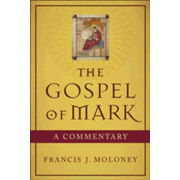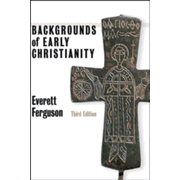OUR STUDY begins with a lesson for the First Sunday of
Lent as acquired from the Gospel According to Saint Mark. Such as a Master of Ceremonies
who would set the stage for the main course of a play, our author provided us with
introduction for what was to come.
In
those days Jesus came from Nazareth of Galilee and was baptized by John in the
Jordan. And when he came up out of the water, immediately he saw the heavens
opened and the Spirit descending upon him like a dove; and a voice came from
heaven, “Thou art my beloved Son; with thee I am well pleased.”
The
Spirit immediately drove him out into the wilderness. And he was in the
wilderness forty days, tempted by Satan; and he was with the wild beasts; and
the angels ministered to him.
Now after John was arrested, Jesus came into
Galilee, preaching the gospel of God, and saying, “The time is fulfilled, and
the kingdom of God is at hand; repent, and believe in the gospel.” (Mark 1:9-15)
 |
Gospel of Mark, The: A Commentary - eBook By Francis J. Moloney |
Our Author?
Those of us who once again experience
our walk through the Sundays of Lent and are led to the foot of the
Lord’s cross, come to know the redemption story... and we are brought to love its flow. However, the community of
Mark did not write this gospel just for entertainment. Mark wrote for another,
definite purpose. Highly likely is the assumption that all gospel writers gathered myriads of oral material. Therefore they deliberately blended witnesses of Peter and Mark… and thus proceeded to
introduce a written story center stage. Subsequently the text we read today is
primarily purposed for those who had not yet heard the Good News.
If we look
closely at the beginning as we study here, we can easily see seams. The Divine
drama gradually unfolded. First the topic was noted clearly. It rolled out like a headline placed
only yesterday on a marquee or in the theater lobby. Told by Mark as introductory words, the purpose was
prominently advertised. Hear the good news… the Gospel of Jesus Christ, the Son of
God!
In rapid sequence thereafter, as if supplied by an unseen emcee who existed as an off-stage voice, our mind’s video presentation becomes anchored. The unfolding comes introduced by ancient text drawn from Isaiah. Thus rooting we readers or listeners to a divinely familiar stage, the gospel record quickly opened with the word… “Behold!
In rapid sequence thereafter, as if supplied by an unseen emcee who existed as an off-stage voice, our mind’s video presentation becomes anchored. The unfolding comes introduced by ancient text drawn from Isaiah. Thus rooting we readers or listeners to a divinely familiar stage, the gospel record quickly opened with the word… “Behold!
 |
Backgrounds of Early Christianity, Third Edition By Everett Ferguson |
In our modern
terms, the authors by the power of the Holy Spirit therefore said, “Pay
attention!” Effectively the writers announced that prophets had predicted that a
messenger would tell of the Messiah’s appearance. That person was interpreted by
the author to be John the Baptist. John quickly took center
stage only as a preparatory character, pictured not as the fulfillment of God’s
promise but as a sent witness. His purpose was to call the audience’s attention
to our sinful human failures before God. He was staged then to tell of the steadfast love
that God provides. As readers, a guided conclusion echoes rightly within us,,, "We cannot get clean on our own!"
The literary stage is set therefore in rather liquid fashion by Mark. The waters of the Jordan River, like the waters
of our own baptism, provide us with the needed backdrop for life. Familiar to
many… to those who walk in the faith of the Church both then and now… the watery scene opens for us on the story of Jesus’ baptism as carried out by John. The writer immerses us even today in the flow.
Subsequently, this seems to be the real beginning of the story… for the author boldly used historical terms, “In those days…” he said! Erroneously, we who are seated in sin often wish to see this curtain unfolding as fable. Some might deem it as a familiar, “Once upon a time…” opening. It would be so if not anchored in reality. Witnesses spurred by the Holy Spirit knew that the story was not fiction. This drama is not a just wonderful mystery.
Subsequently, this seems to be the real beginning of the story… for the author boldly used historical terms, “In those days…” he said! Erroneously, we who are seated in sin often wish to see this curtain unfolding as fable. Some might deem it as a familiar, “Once upon a time…” opening. It would be so if not anchored in reality. Witnesses spurred by the Holy Spirit knew that the story was not fiction. This drama is not a just wonderful mystery.
 |
We Will Not Be Silenced: Responding with Courage to Our Culture's Assault on Christianity By Erwin W. Lutzer |
Enter Stage "Right"
The drama does not address the uncertainty of, “Why
would the sinless Son of God need to receive baptism for repentance?’ You see, our Lord's baptism was
not at issue for Mark or his gathered community, so that uncertainty was not voiced in the writing. As so professed by some scriptural critics, the
central message of the drama begins where Jesus appears on stage as an adult. He was rightly announced by John as the greater of the two persons, but yet received baptism by
John. Jesus appears without any discussion over a need for cleansing… since
there was none. Mark boldly presented Jesus as being the One who
would baptize us with the exclusive and divine, the special and set-apart Holy Spirit. For Mark then, Jesus was the main, revealed character presented beneath spotlight by the
subsequent story. The revelation written points
the reading audience toward Jesus alone as the Beloved. Jesus stands boldly before all who read or hear.
Here we see, however, that the Greek word ευθυς appears in Mark. Rendered in English
as “immediately” or “straightaway”, we find that the word resounds repeatedly through
the entire writing of Mark. The word occurs like the literal soft “click” of a
slide projector control, or the “enter”
button on a mouse of a computerized video presentation. Repeatedly, the word smoothly fades our
attention to yet another scene. The word transitions us in faith therefore… moving
us along toward revealing the Truth.
To illuminate this flow, please note that this quick change of scenery backdrop unfolds “immediately” in the gospel writing. Our author related a statement and little more about Jesus’ journey into the wilderness. However, our gospel does not allow us to remain on the edge of our seats for long. We cannot remain dwelling in a wilderness of doubt and testing. Quickly the story propels us past the arrest of John the Baptist without further explanation and brings us back as reading audience to the central purpose of Jesus’ arrival upon the central stage of history.
To illuminate this flow, please note that this quick change of scenery backdrop unfolds “immediately” in the gospel writing. Our author related a statement and little more about Jesus’ journey into the wilderness. However, our gospel does not allow us to remain on the edge of our seats for long. We cannot remain dwelling in a wilderness of doubt and testing. Quickly the story propels us past the arrest of John the Baptist without further explanation and brings us back as reading audience to the central purpose of Jesus’ arrival upon the central stage of history.
You see,
according to Mark, the good news was not about John, nor the Satanic demonic seen in the wilderness as told by Matthew and Luke.
The purpose was to boldly and quickly tell us that Jesus is the both Messenger and the Message.
He is the Good News! Jesus is both the evangelist and the sure arrival of eternal
salvation.
High Drama!
Mark stated this
gospel clearly and concisely. Jesus said right away in Mark that the time in
which he spoke was “now” time… as not in “chronological" time, but rather he spoke in “right"
time. In God’s eternal “right” time keeping, Mark clearly states
both the then and the now of the gospel. We consequently may realize that the time for each of us is still “now” as the Gospel is read or heard.
I echo to you that most certainly the kingdom of God was at hand as our Lord spoke, and is yet available. Mark gave to those in his audience long ago, what he through the Holy Spirit now offers also to us. Mark gives to those who read and will witness the Good News, the Gospel… the fantastic instructions to believe in and follow Jesus.
I echo to you that most certainly the kingdom of God was at hand as our Lord spoke, and is yet available. Mark gave to those in his audience long ago, what he through the Holy Spirit now offers also to us. Mark gives to those who read and will witness the Good News, the Gospel… the fantastic instructions to believe in and follow Jesus.
In conclusion we find at final curtain... our Lord Jesus,
who is the Son of God according to the witness of the Holy Spirit. All of humanity, those of us who have been sinfully immersed in writing our own
life scripts… are given clear direction for our lives. If only we listen and turn to face our Judge, Lord and Savior!
Scripture reveals that those
who are trapped in the darkness behind the world’s stage lights… are called to squirm out front in Church theater seats. With the scriptural spot light turned and lowered upon us from the altar, we face condemnation under the Law. Then with grace, the stage illumines us with the brilliant love of our Father in heaven.
"Believe the Good News" we are told. Our gentle Lord yet stands center stage, telling us… "For the kingdom of
God is at hand." As people of God who are gathered properly onto the stage of creation during
the coming weeks of Lent, I ask you to consider just what that means.


No comments:
Post a Comment